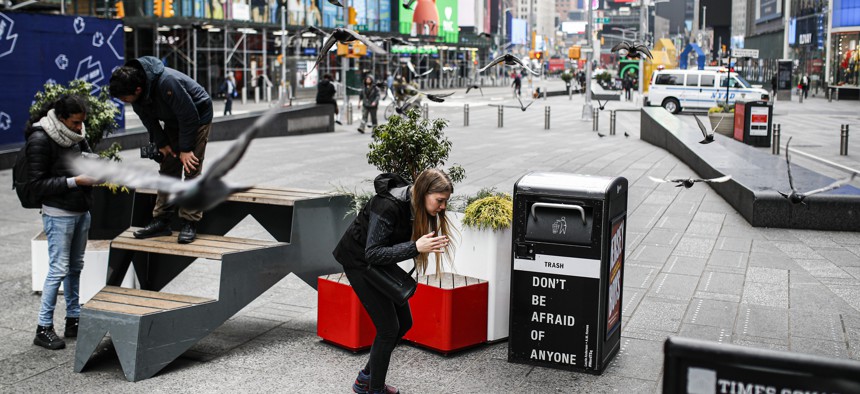New York and California Governors Order Most People to Stay Home

A visitor ducks under a flock of flying pigeons in a sparsely populated Times Square, Friday, March 20, 2020, in New York. New York Gov. Andrew Cuomo is ordering all workers in non-essential businesses to stay home and banning gatherings statewide. AP Photo
STATE AND LOCAL ROUNDUP | New York orders all non-essential businesses to close and workers to stay home, the day after California imposed "shelter in place" across the state ... Florida counties closing beaches, while governor resists issuing order ... Wastewater administrators ask people to stop flushing wipes.
The governors of New York and California—two large states with growing numbers of Covid-19 cases—are ordering most people to stay at home going forward, saying they hoped aggressive mandates to restrict people’s movements will stem the spread of the coronavirus and keep medical systems from being overwhelmed.
NEW YORK | Gov. Andrew Cuomo told the state’s 19 million residents on Friday they will be required to stay inside, ordering most businesses to keep their employees at home starting on Sunday. The move was necessary because of the surging number of coronavirus cases in the state, which topped 7,000 on Friday, the governor said during a briefing in Albany. “When I talk about the most drastic action we can take, this is the most drastic action we can take,” Cuomo said, noting at one point that the number of cases “portends a total overwhelming of our hospital systems.” And he made clear that they were not requests, with fines for businesses that don’t comply. “These provisions will be enforced. These are not helpful hints,” he said. The decision came after days of back-and-forth between Cuomo and New York City Mayor Bill de Blasio, with the mayor pushing for a more aggressive “shelter-in-place” order than the governor wanted for several days. Cuomo said he still resisted that terminology, but the mandates he outlined are somewhat consistent with what has been implemented in other places, like California. The governor acknowledged that the impact on non-essential businesses will be severe, with many forced to close and layoff employees. “We’re all in quarantine now. We’re all in various levels of quarantine and it’s hard,” he said. [New York Times; CNBC]
CALIFORNIA | The decision in New York came the day after California Gov. Gavin Newsom on Thursday ordered state residents—40 million people—to stay in their homes, expanding on “shelter-in-place” mandates already imposed in Los Angeles and San Francisco. The decision made California the first state to require people to stay home, although people will be allowed to go out for certain errands and the order exempts workers in particular industries. Among the allowable activities: getting gas, food shopping, visits to pharmacies, trips to care for a relative or seeking health care. [Los Angeles Times; CalMatters]
What are essential businesses and workers at this time, aside from people in health care? In New York, Cuomo said food delivery services and public transportation would remain open. In California, exemptions to the governor’s shelter-in-place order include employees in the food sector and emergency responders. The California order exempted workers in 16 sectors. But CNN reports that New York’s order is less specific, with Cuomo saying they were coming up with a list of essential businesses.
Other states that have taken other aggressive steps to encourage residents to stay at home, such as closing schools and banning most gatherings, haven’t yet moved into embracing “shelter in place.” On Thursday, Maryland Gov. Larry Hogan said he wasn’t yet at a place where he saw that as necessary. “We’re trying to avoid locking down society and we’re trying to keep things as normal as possible,” Hogan said, while noting the idea has come up among discussions with governors. A spokesman for Ohio Gov. Mike DeWine said he is frequently reviewing the situation, but so far believes people are following his recommendations to socially distance to prevent spread of the respiratory illness.
FLORIDA | After recent images of spring break revelers partying in large groups on Florida beaches, Maryland Gov. Larry Hogan on Friday asked spring break travelers returning to the state to quarantine themselves for two weeks and refrain from contact with older people. Florida Governor Ron DeSantis has faced increasing pressure to order all beaches closed, but on Thursday defended his actions, saying that law enforcement is breaking up groups of large people. He also said he didn’t want to discourage people in areas with no community spread of the coronavirus from engaging in healthy outside activity. “I don’t want to be in a situation where we’re diverting people unwittingly into activities that are going to be more dangerous for passing the virus,” he said. But more county leaders said they would be ordering the beaches closed, including in the area that went viral with images of young people partying. On Friday, health care leaders in Pensacola urged their commissioners to order beaches closed. "The time is now for all of us to take actions that will encourage social distancing," they said in a letter. [Politico]
ARIZONA | After growing criticism that the Arizona state government hadn’t been aggressive enough in imposing restrictions to halt the spread of the coronavirus, Gov. Doug Ducey ordered theaters, gyms, restaurants and bars in six counties to close on Friday, while also halting elective surgeries. The National Guard is also activated to help restock grocery stores. Mayors in a handful of cities, including Phoenix and Tucson, had already ordered bars to close and limited restaurant service to dine-in only. [Arizona Republic]
BETTER FLUSHING | Wastewater system administrators in Connecticut are reminding people not to flush so-called “flushable wipes,” which actually shouldn’t be flushed. Clogs are increasing as people struggle to find toilet paper and are turning to alternatives. They say generally only flush these three items: pee, poop and toilet paper. [Hartford Courant]
Laura Maggi is the Managing Editor of Route Fifty.
NEXT STORY: Crowdsourcing to Fight a Pandemic






